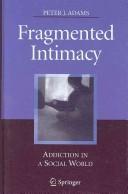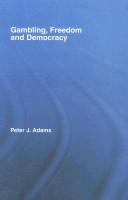| Listing 1 - 9 of 9 |
Sort by
|

ISBN: 128114147X 9786611141479 0387726616 0387726608 1441924868 Year: 2008 Publisher: New York : Springer,
Abstract | Keywords | Export | Availability | Bookmark
 Loading...
Loading...Choose an application
- Reference Manager
- EndNote
- RefWorks (Direct export to RefWorks)
Fragmented Intimacy transcends familiar concepts of addiction by focusing not on addicts in isolation but on the social contexts that are disrupted and on the struggle that affects all those involved as they attempt to regroup and initiate change. Applicable to drugs, alcohol, and gambling, this engagingly written book offers both innovative theory and practice-strengthening interventions. Peter Adams’ social-ecology framework examines in depth how addiction disrupts social identity, becoming the dominant relationship in a person’s life and leading thereby to a weakening of connections to family, friends, workplace, and community. It examines how in the long-term course of an addiction one-on-one counseling will have little effect unless it assists in the re-engagement of these core intimacies. The author enhances the reader’s understanding with vignettes of addicted individuals’ lives as relationships are altered (and insights from such chemically-intimate authors as Burroughs and Poe), new takes on the therapeutic relationship, and examples of families, neighborhoods, and communities mobilizing as powerful forces for re-entry. A sample of the coverage: Rethinking addiction through the lens of intimacy. Social processes in intimacy versus social processes in addiction. Effects of addiction throughout the individual’s social networks. Opportunities for intervention at different stages of addiction. Resilience building at the individual, family, and community levels. Guidelines for family members in initiating change. Using social approaches to complement mainstream forms of therapy—starting with assessment. Fragmented Intimacy provides fresh perspective and new tools for frontline addiction counselors, clinical and health psychologists, social workers, and public health professionals while remaining accessible to the researcher or student in these fields. Its focus on the role of intimacy also provides a useful guide to family members in their response to addicted loved ones.
Compulsive behavior. --- Intimacy (Psychology) --- Compulsive behavior --- Addicts --- Treatment. --- Social aspects. --- Social networks. --- Addicted persons --- Addictive persons --- Sick --- Addictive behavior --- Behavior, Compulsive --- Compulsion (Psychology) --- Impulse --- Psychology, Pathological --- Obsessive-compulsive disorder --- Emotions --- Interpersonal relations --- Love --- Psychology, clinical. --- Health Psychology. --- Clinical Psychology. --- Public Health. --- Clinical psychology. --- Psychiatry --- Psychology, Applied --- Psychological tests --- Health psychology. --- Public health. --- Community health --- Health services --- Hygiene, Public --- Hygiene, Social --- Public health services --- Public hygiene --- Social hygiene --- Health --- Human services --- Biosecurity --- Health literacy --- Medicine, Preventive --- National health services --- Sanitation --- Health psychology --- Health psychology, Clinical --- Psychology, Clinical health --- Psychology, Health --- Salutogenesis --- Clinical psychology --- Medicine and psychology
Book
ISBN: 3030452085 3030452077 Year: 2020 Publisher: Cham : Springer International Publishing : Imprint: Palgrave Macmillan,
Abstract | Keywords | Export | Availability | Bookmark
 Loading...
Loading...Choose an application
- Reference Manager
- EndNote
- RefWorks (Direct export to RefWorks)
This book develops a new and innovative way of understanding how language is used when people describe their spiritual and mystical encounters. Early chapters provide overviews of the nature of spiritual encounters, how commonly they occur, and the role of language. The book then develops a unique way of understanding the dynamics of talking about spirituality, using original research to supports this perspective. In particular, Peter J. Adams explores how this characteristically vague way of speaking can be viewed as an intentional and not an incidental aspect of such communications because certain types of vagueness have the capacity to engage the imaginative participation of receptive listeners. This expressive vagueness is achieved by embedding missing bits, or “gaps”, in the flow of what is described and these in turn provide sites for listeners to insert their own content. Later chapters focus on practical ways people (including helping professionals) can improve their skills in talking about their spiritual encounters. All content is situated in café conversations between four people each of whom is, in their own way, concerned with the challenges they face in converting the content of their encounters into words.
Conversation --- Religious aspects. --- Health—Religious aspects. --- Psychotherapy. --- Counseling. --- Spirituality. --- Religion and Health. --- Psychotherapy and Counseling. --- Spiritual-mindedness --- Philosophy --- Religion --- Spiritual life --- Counselling --- Helping behavior --- Psychology, Applied --- Clinical sociology --- Interviewing --- Personal coaching --- Social case work --- Psychagogy --- Therapy (Psychotherapy) --- Mental illness --- Mental health counseling --- Treatment

ISBN: 9780415957625 Year: 2007 Publisher: New York : Routledge,
Abstract | Keywords | Export | Availability | Bookmark
 Loading...
Loading...Choose an application
- Reference Manager
- EndNote
- RefWorks (Direct export to RefWorks)
Book
ISBN: 9781107091207 9781316118689 9781107463097 Year: 2016 Publisher: Cambridge Cambridge University Press
Abstract | Keywords | Export | Availability | Bookmark
 Loading...
Loading...Choose an application
- Reference Manager
- EndNote
- RefWorks (Direct export to RefWorks)
"Tobacco, alcohol and gambling corporations have been highly effective in stalling, diverting and blocking public health measures. This book provides an original and engaging expose; of the ethical issues faced by people and organizations when they accept industry money in ways that facilitate corporate influence with the public and with policy makers. It starts with a detailed examination of the risks of accepting such profits and what might be done to reduce them, then moves on to introduce the concept of a continuum of 'moral jeopardy' which shifts the emphasis from accept/not accept binaries to a focus on the extent to which people are willing to accept funding. This shift encourages people to think and speak more about the risks and to develop clearer positions for themselves. The content will be helpful to those working in government agencies, addiction services, community organizations or anyone interested in reducing the harms of addictive consumption"--
Alcoholic Beverages --- Behavior, Addictive --- Charities --- Ethics, Business. --- Financing, Organized --- Gambling --- Health Care Sector --- Tobacco Industry --- Economics. --- Ethics.
Digital
ISBN: 9780387726618 Year: 2008 Publisher: New York, NY Springer Science + Business Media, LLC
Abstract | Keywords | Export | Availability | Bookmark
 Loading...
Loading...Choose an application
- Reference Manager
- EndNote
- RefWorks (Direct export to RefWorks)
Psychology --- Hygiene. Public health. Protection --- Psychiatry --- volksgezondheid --- medische psychologie --- klinische psychologie
Book
ISBN: 9780190945008 9780190945022 9780190945039 Year: 2020 Publisher: New York, N.Y. Oxford University Press
Abstract | Keywords | Export | Availability | Bookmark
 Loading...
Loading...Choose an application
- Reference Manager
- EndNote
- RefWorks (Direct export to RefWorks)
Book
ISBN: 1316668169 131666886X 1316118681 Year: 2016 Publisher: Cambridge : Cambridge University Press,
Abstract | Keywords | Export | Availability | Bookmark
 Loading...
Loading...Choose an application
- Reference Manager
- EndNote
- RefWorks (Direct export to RefWorks)
Tobacco, alcohol and gambling corporations have been highly effective in stalling, diverting and blocking public health measures. This book provides an original and engaging exposé of the ethical issues faced by people and organizations when they accept industry money in ways that facilitate corporate influence with the public and with policy makers. It starts with a detailed examination of the risks of accepting such profits and what might be done to reduce them, then moves on to introduce the concept of a continuum of 'moral jeopardy' which shifts the emphasis from accept/not accept binaries to a focus on the extent to which people are willing to accept funding. This shift encourages people to think and speak more about the risks and to develop clearer positions for themselves. The content will be helpful to those working in government agencies, addiction services, community organizations or anyone interested in reducing the harms of addictive consumption.
Book
ISBN: 9780387726618 Year: 2008 Publisher: New York NY Springer New York
Abstract | Keywords | Export | Availability | Bookmark
 Loading...
Loading...Choose an application
- Reference Manager
- EndNote
- RefWorks (Direct export to RefWorks)
Fragmented Intimacy transcends familiar concepts of addiction by focusing not on addicts in isolation but on the social contexts that are disrupted and on the struggle that affects all those involved as they attempt to regroup and initiate change. Applicable to drugs, alcohol, and gambling, this engagingly written book offers both innovative theory and practice-strengthening interventions. Peter Adams' social-ecology framework examines in depth how addiction disrupts social identity, becoming the dominant relationship in a person's life and leading thereby to a weakening of connections to family, friends, workplace, and community. It examines how in the long-term course of an addiction one-on-one counseling will have little effect unless it assists in the re-engagement of these core intimacies. The author enhances the reader's understanding with vignettes of addicted individuals' lives as relationships are altered (and insights from such chemically-intimate authors as Burroughs and Poe), new takes on the therapeutic relationship, and examples of families, neighborhoods, and communities mobilizing as powerful forces for re-entry. A sample of the coverage: Rethinking addiction through the lens of intimacy. Social processes in intimacy versus social processes in addiction. Effects of addiction throughout the individual's social networks. Opportunities for intervention at different stages of addiction. Resilience building at the individual, family, and community levels. Guidelines for family members in initiating change. Using social approaches to complement mainstream forms of therapy starting with assessment. Fragmented Intimacy provides fresh perspective and new tools for frontline addiction counselors, clinical and health psychologists, social workers, and public health professionals while remaining accessible to the researcher or student in these fields. Its focus on the role of intimacy also provides a useful guide to family members in their response to addicted loved ones.
Psychology --- Hygiene. Public health. Protection --- Psychiatry --- volksgezondheid --- medische psychologie --- klinische psychologie
Multi
ISBN: 9783030452087 Year: 2020 Publisher: Cham Springer International Publishing :Imprint: Palgrave Macmillan
Abstract | Keywords | Export | Availability | Bookmark
 Loading...
Loading...Choose an application
- Reference Manager
- EndNote
- RefWorks (Direct export to RefWorks)
This book develops a new and innovative way of understanding how language is used when people describe their spiritual and mystical encounters. Early chapters provide overviews of the nature of spiritual encounters, how commonly they occur, and the role of language. The book then develops a unique way of understanding the dynamics of talking about spirituality, using original research to supports this perspective. In particular, Peter J. Adams explores how this characteristically vague way of speaking can be viewed as an intentional and not an incidental aspect of such communications because certain types of vagueness have the capacity to engage the imaginative participation of receptive listeners. This expressive vagueness is achieved by embedding missing bits, or “gaps”, in the flow of what is described and these in turn provide sites for listeners to insert their own content. Later chapters focus on practical ways people (including helping professionals) can improve their skills in talking about their spiritual encounters. All content is situated in café conversations between four people each of whom is, in their own way, concerned with the challenges they face in converting the content of their encounters into words.
Christian religion --- Sociology of religion --- Sociology of health --- Law --- Hygiene. Public health. Protection --- Psychiatry --- spiritualiteit --- gezondheid --- psychotherapie --- godsdienst --- counseling
| Listing 1 - 9 of 9 |
Sort by
|

 Search
Search Feedback
Feedback About UniCat
About UniCat  Help
Help News
News